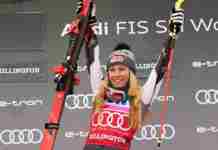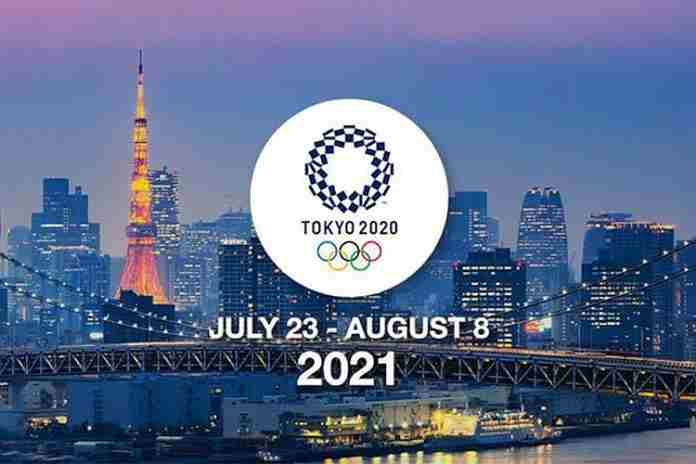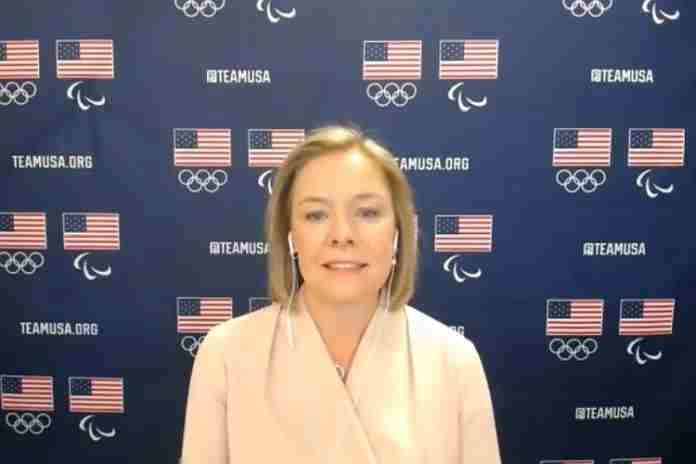(★ Friends: Appreciation is the greatest gift of all. Now received are 28 donations toward the new bill for server and support costs; with the overage from the summer, we’re at 76% of our goal. This isn’t the easiest time to ask, but if you would like to help, please donate here. Your enthusiasm is the reason this site continues. ★)
The latest news, notes and quotes from the worldwide Five-Ring Circus:
● Games of the XXXII Olympiad: Tokyo 2020 ● Good news for the Tokyo organizers as reports filtered out that all 68 of its domestic sponsorship partners have agreed to extend their rights for 2021.
The Associated Press reported “The Japanese newspaper Nikkei reported earlier this month – citing sources close to the matter – that the top 15 so-called ‘Gold Partners’ would contribute an added 1 billion yen each. This is about $10 million each.”
This will not come close to covering the added costs to the organizers of the postponement of the Games, but it will help.
¶
Tokyo 2020 also announced a change in its management team for the Opening and Closing Ceremonies, naming ad agency owner Hiroshi Sasaki as the chief creative director. He replaces actor Nomura Mansai, who will become an advisor.
Sasaki told reporters at a 23 December news conference, “I want to express some sort of breakthrough or hope for the future. This is a chance to change the inflated image of Olympic ceremonies as being flamboyant stage shows.”
The budget for the ceremonies was recently increased from ¥13 billion [~$125.4 million] to ¥16.5 billion yen [~$159.1 million], again related to the postponement.
¶
Tokyo 2020 reported that “Ticket purchasers have applied for refunds on about 200,000 of the roughly 970,000 tickets sold in Japan for the postponed Tokyo Paralympics.” Refunds will begin distribution in January.
Kyoto News also noted that “Organizers received requests for refunds on about 810,000, or roughly 18 percent of the 4.45 million tickets sold domestically for the Olympics.”
● World Anti-Doping Agency ● While the Russian Anti-Doping Agency may have been pleased with the reduced sanctions from the Court of Arbitration for Sport last week, the Russian government was not. Spokesman Dmitry Peskov told reporters:
“Of course, we lament this ruling. And we have a negative attitude to it.
“We intend to maintain close contacts with international sports federations. We will carry on with this dialogue and will continue protecting our interests resorting to all available means.
“The most important thing is that athletes get the right to take part in international competitions. This will help them maintain their international qualifications and keep in shape.”
¶
WADA also published its testing report for 2019, showing 278,047 tests during the calendar year, of which 228,560 were in Olympic sports. Of those, there were 1,800 samples which showed possible violations, or just 0.79%.
The good news was that the number of tests increased from 263,519 in 2018 (220,659 in Olympic sports) and the number of “Adverse Analytical Findings” declined from 1,659 to 1,519.
Among the Olympic sports, Football had the most tests with 40,233 and 138 Adverse Analytical Findings, followed by Athletics with 34,576 and 253 AAFS, then Cycling (24,577 and 243).
Equestrian had the highest incidence of AAFs at 1.8% (13 of 733), followed by Weightlifting at 1.5% (188 of 12,849).
● Aquatics ● The long saga of China’s triple Olympic distance gold medalist Yang Sun is not over. The Swiss Federal Tribunal announced on Thursday (24th):
“In its decision of 22 December 2020, the Swiss Federal Supreme Court approved the request by the Chinese swimmer Sun Yang for revision of the arbitral award of the Court of Arbitration for Sport (CAS) in Lausanne dated 28 February 2020 (decision CAS 2019/A/6148) on the grounds of bias of one of the arbitrators of the CAS. The award of the CAS is set aside. The CAS will have to render a new award in the case of Sun Yang in a different composition of the panel.”
Sun was banned for eight years after destroying doping samples collected at his time on 4 September 2018. His appeal does not clear him, but will require a new proceeding; the last was a near-circus of mis-understandings and poor interpretation from English to Chinese and vice versa. But this will all start up again.
The World Anti-Doping Agency issued a quick statement indicating its intention to continue to pursue the matter:
“The Swiss Federal Tribunal’s decision upholds a challenge against the Chair of the CAS Panel [Italian Franco Fattini] and makes no comment on the substance of this case.
“In the CAS award, WADA clearly prevailed on the substance of the case as it was able to show that there were a number of aspects of the original FINA decision that were incorrect under the World Anti-Doping Code and the related International Standard for Testing and Investigations. WADA will take steps to present its case robustly again when the matter returns to the CAS Panel, which will be chaired by a different president.”
● Archery ● The U.S. Anti-Doping Agency announced that one of the world’s top archers, American Brady Ellison, a medal favorite for Tokyo:
“has tested positive for a prohibited substance, which was determined to have been ingested by him without fault or negligence. As a result, Ellison will not face a period of ineligibility for his positive test.
“‘If an athlete ingests a prohibited substance from a completely innocent source, such as contaminated medication, meat, or water, and there is no effect on performance, there should not be a violation or a public announcement,’ said Travis T. Tygart, Chief Executive Officer of USADA. ‘We have now had more than 25 of these tragic no-fault cases since 2016, and the injustice keeps happening. On behalf of athletes, USADA will continue to urge WADA to reform the system to be more fair, effective, and efficient.’”
Ellison provided records showing his use of a prescribed medication which – although it did not show hydrochlorothiazide (HCTZ) as an ingredient – included the prohibited substance. The results came from a 7 October 2020 out-of-competition test.
● Athletics ● A new study from Cornell University estimated the expected – but not guaranteed – benefit to elite athletes wearing the Nike Vaporfly shoes (models using a carbon fiber plate stacked inside of a highly responsive foam sole) in marathons:
“For men, the improvement is most likely somewhere between 2.1 and 4.1 minutes, or between 1.5% and 2.9%. For women it is likely between 1.2 and 4.0 minutes, or between 0.8% and 2.4%.”
This is less than the 4-5% advantage from some other studies, and includes data from 2015-19 from 578 elite and sub-elite athletes, running in 21 different races for a total of 1,618 performances from 2015-19. From the raw data, the researchers noted “we see that most runners’ average time in Vaporfly shoes is faster than their average time in non-Vaporfly shoes. Specifically, 53 of 71 men (74.5%) who switched to Vaporflys ran faster in them, and 40 of 56 women (71.4%) who switched to Vaporflys ran faster in them.”
Using even the lower levels of advantage, two minutes and six seconds for men and 72 seconds for women is a lot, with corresponding, lesser advantages in the Half Marathon and track races like the 10,000 m.
● Football ● FIFA announced the distribution of teams for the 2023 Women’s World Cup, to include host teams Australia and New Zealand plus:
● 11 direct slots for Europe (UEFA);
● 5 direct slots for Asia (AFC, +1 for Australia);
● 4 direct slots for Africa (CAF);
● 4 direct slots for North & Central America & the Caribbean (CONCACAF);
● 3 direct slots for South America (CONMEBOL);
● 1 direct slot for Oceania (New Zealand).
The other three slots will be determined in a 10-team playoff in which all of the confederations will receive one or two entrants.
Due to the pandemic, the FIFA Council also canceled the men’s U-17 World Cup and U-20 World Cup for 2021 and moved these tournaments to 2023 with the 2021 hosts – Peru (U-17) and Indonesia (U-20) agreeing to stage these events.
● Weightlifting ● The year-end message from Interim IWF President Dr. Michael Irani (GBR) warned of difficult times ahead:
“Frankly, 2020 has been a difficult year. 2021 promises to be better, but huge efforts will continue to have to be made to ensure this proves to be the case. …
“The athlete’s voice will be key among those listened to, as will those who decide our Olympic fate. For me, the lowest point of this year as far as the IWF is concerned came when the IOC decided to heavily cut the proposed medals and places available for weightlifters at Paris 2024. Young weightlifters will have been deprived of opportunities through no fault of their own, but by the cheating and malfeasance of others. We must be determined to do better.
“We should also be under no illusion as to the hard work that lies ahead and the obstacles we must overcome. For example, we must make arrangements so that the Congresses can take place regardless of travel restrictions. We will also need widespread cooperation. For example, Professor [Richard] McLaren has yet to release the second part of his report to the [International Testing Agency], the [IWF] Disciplinary and Ethics Commission or the independent members of the Reform and Governance Commission, despite being asked to do so.”
Beyond the continuing doping revelations plaguing the sport, the lack of adequate athlete representation within the IWF is a significant factor in the IOC’s displeasure with it. McLaren’s second report may be forthcoming since the IWF did conclude an agreement with the ITA to handle its doping controls going forward to 2024.
The federation will consider a new constitution and bylaws early in 2021 and its Olympic future may hinge not only on passage, but on how quickly it is implemented.
● The Last Word ● UK Sport announced its government-provided athlete support program has increased to £352 million (~$476.5 million) for the 2021-24 time frame, but many sports will actually get less money than they did for the 2016-20 Tokyo cycle.
The new allocation of £352 million will be split among 43 sports for Paris 2024 vs. £345 million (~$466.9 million) for 32 sports for Tokyo 2020. Sky Sports noted:
“That means money for emerging sports, such as climbing, surfing and skateboarding – which will all feature at the Olympic Games for the first time in Tokyo next summer – via a progression fund. In total, seven sports will share a £10.3m funding pot.
“An additional new fund worth £3m will be open to applications from other sports such as breakdancing, which is set to feature at the Olympics in Paris for the first time and did not apply for progression funding.”
As a result, funding for rowing was reduced by nearly 10%, swimming by 11.4%, equestrian by 11.6%, modern pentathlon by 20%, gymnastics by 6.7%, sailing by 4% and athletics by 3.6%.
There were increases for cycling (+12%), badminton and archery.
UK Sport is separate from the British Olympic Association – the National Olympic Committee for Britain – which is tiny by comparison, with income of just £13.3 million (~$18.0 million) in 2019.
Although not an exact comparison, the USOPC budget for 2017-20 earmarked $758.5 million for athlete grants, competition and travel support, sports medicine, NGB support and training center funding.
You can receive our exclusive TSX Report by e-mail by clicking here. You can also refer a friend by clicking here, and can donate here to keep this site going.
For our 526-event International Sports Calendar from October 2020 to June 2021, by date and by sport, click here!























